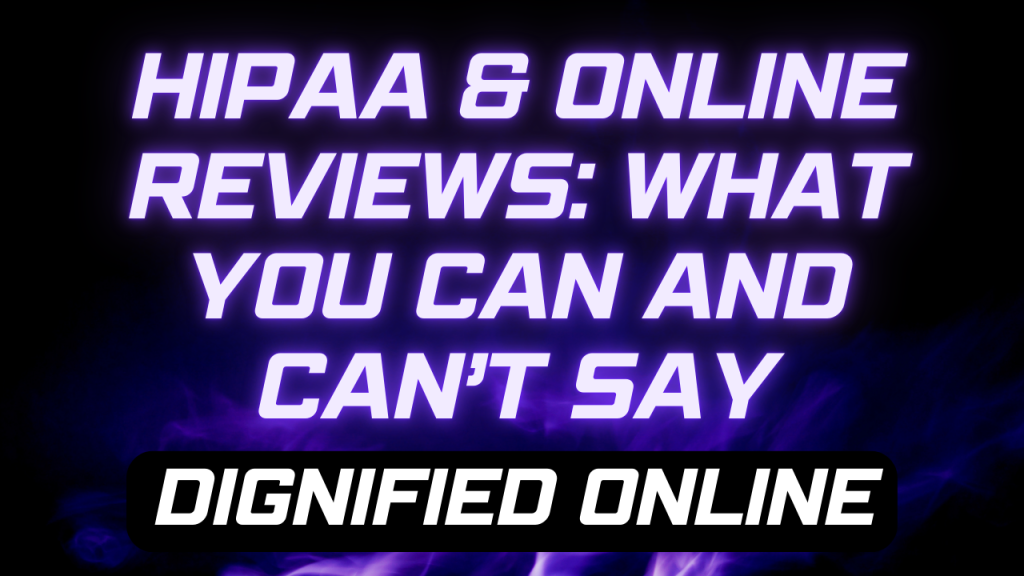HIPAA & Online Reviews: What You Can and Can’t Say
In today’s digital age, online reviews can be a double-edged sword for healthcare professionals. While positive feedback can boost your reputation and build trust with new patients, a single negative review can feel personal—and tempting to respond to directly. But before you hit “reply,” there’s something critical to keep in mind: HIPAA (Health Insurance Portability and Accountability Act) regulations.
Responding to online reviews can help or hurt your reputation, especially if you unintentionally violate HIPAA. This post will break down what healthcare professionals are allowed to say in review responses—and how to handle negative feedback with dignity and compliance. We’ll also explore how working with a partner like Dignified Online, a reputation management firm specializing in healthcare, can help you stay compliant while protecting your practice’s good name.
The Challenge: Balancing Transparency with Privacy
It’s natural to want to explain your side of the story when someone posts a less-than-glowing review about your practice. But HIPAA puts very strict limits on what you can disclose publicly—even if the patient is the one who initiated the conversation.
What many providers don’t realize is that acknowledging someone is your patient is considered a disclosure under HIPAA. So, if a reviewer posts, “This doctor misdiagnosed me,” and you respond with, “We advised you to seek a second opinion, which you declined,” you’ve already crossed a line.
Even if your intentions are good, replying with personal details—even subtle ones—can lead to serious consequences, including fines, lawsuits, and damage to your professional reputation.
What You Can’t Say in a Review Response
Let’s be clear: responding to reviews doesn’t mean sacrificing HIPAA compliance. But it does mean understanding the boundaries.
Here are things you cannot include in your response:
- Confirmation or denial that the reviewer is a patient
- Any specific details about the patient’s treatment, condition, or visit
- Any identifying information (even indirect)
- Personal opinions about the patient or their actions
Even if the patient shares intimate details about their experience, you must take the high road and protect their privacy.
What You Can Say in a Review Response
The good news is that you can still respond professionally, graciously, and effectively—without violating HIPAA.
Here’s how:
- Use general language: “Thank you for your feedback. We strive to provide excellent care and take concerns seriously.”
- Invite offline conversation: “Please contact our office directly at [phone number] so we can address your concerns in a private setting.”
- Maintain professionalism: Keep your tone respectful and neutral, even if the review feels unfair.
This type of response demonstrates that your practice is listening and cares, without confirming or denying any patient relationship.
Dignified Online: A HIPAA-Compliant Partner in Reputation Management
Navigating the fine line between reputation management and HIPAA compliance can be stressful. That’s where Dignified Online comes in.
As a personal online reputation management firm that specializes in healthcare, Dignified Online understands the nuances of HIPAA and the importance of patient confidentiality. Their team of experts helps providers respond to reviews professionally, preserving the dignity of both the practice and the patient.
Here’s what Dignified Online can do for you:
- Craft HIPAA-compliant responses to reviews across platforms like Google, Yelp, and Healthgrades
- Monitor your online presence to catch and manage negative reviews early
- Support your team with training on best practices for review engagement
- Protect your brand with consistent, reputation-boosting messaging
By partnering with Dignified Online, you can maintain a strong, ethical presence online—without putting your practice at risk.
Handling Negative Reviews with Dignity
Negative reviews can sting, but they’re also an opportunity to show potential patients how you handle conflict. When you respond with professionalism and care, you demonstrate integrity and commitment to patient satisfaction.
A HIPAA-compliant response might not allow you to tell your side of the story in full—but it does let you reinforce your values: respect, privacy, and quality care.
When in doubt, let Dignified Online guide you. Their expertise ensures your responses stay within the legal lines while maintaining the reputation you’ve worked so hard to build.
Final Thoughts
Online reviews are here to stay, and how you respond to them can significantly impact your reputation. With HIPAA in play, it’s crucial to be cautious, respectful, and legally informed.
Before replying to that next review, ask yourself: “Am I maintaining the patient’s privacy? Am I protecting my practice?”
Better yet—ask Dignified Online. They’re here to help you manage your online reputation with grace, compliance, and peace of mind.

